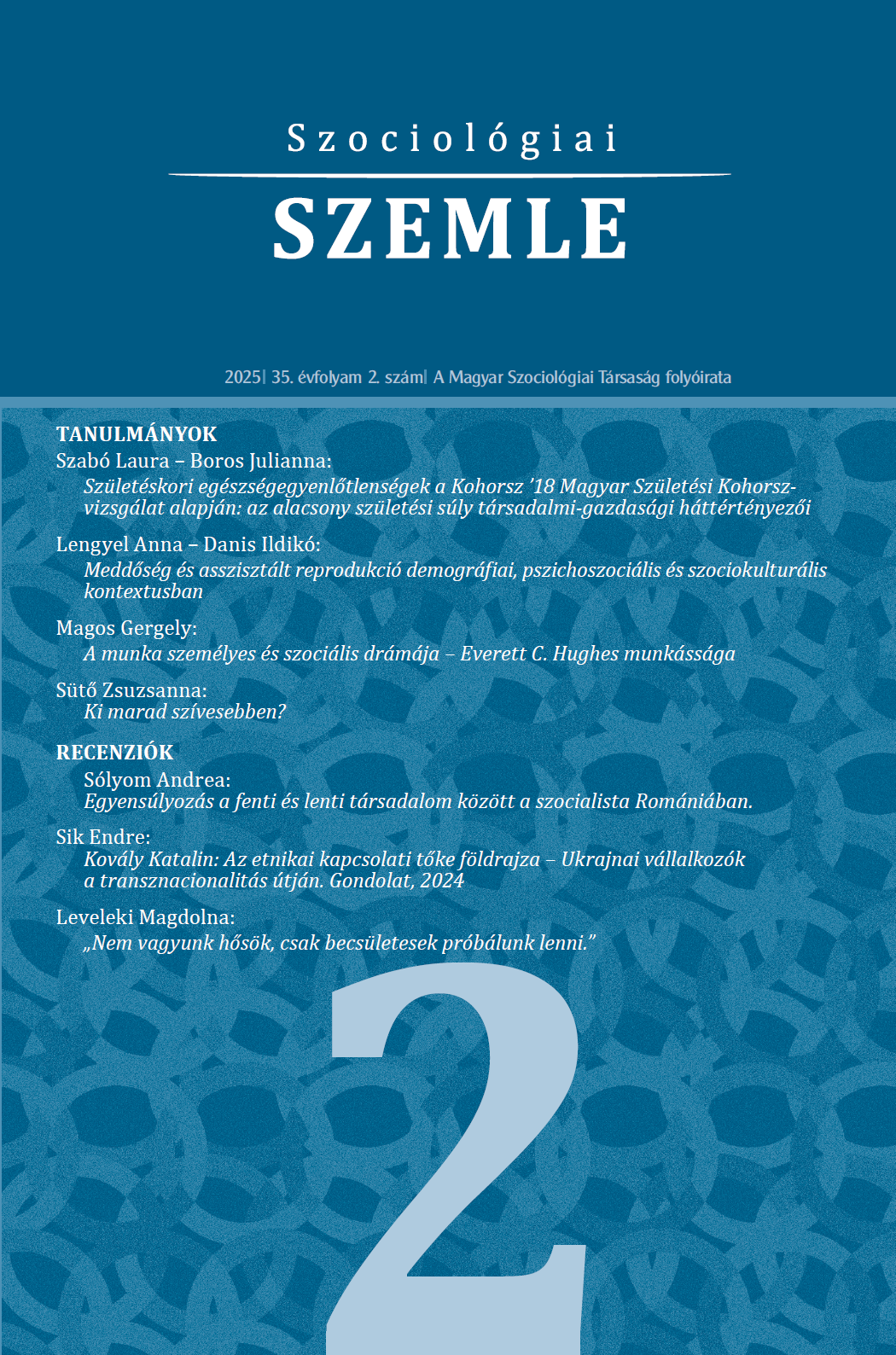A munka személyes és szociális drámája
Everett C. Hughes munkássága
Absztrakt
Everett C. Hughes (1897–1983) munkássága Magyarországon alig ismert. Hazájában, az Egyesült Államokban is inkább a szociológiatörténti pantheon perifériáján helyezkedik el (Helmes-Hayes–Santoro 2016), ismertsége és hatása nem mérhető olyan kortársaihoz, mint Parsons és Lazarsfeld. Ennek oka az, hogy utóbbiakkal ellentétben nem dolgozta ki szisztematikusan sem elméleti, sem módszertani alapelveit. Emögött azonban tudatos döntés állt. Úgy vélte, a módszertani vagy elméleti kiindulópont rögzítése korlátozza a kutatás tárgyának megismerését, ellentétes a „szociológiai képzelettel”, és végső soron dogmatizmushoz vezethet. Tanulmányomban arra teszek kísérletet, hogy – a nemzetközi szakirodalom alapján és elsősorban Hughes munkaszociológiai kutatásaira fókuszálva – rekonstruáljam és röviden bemutassam elméleti és módszertani alapvetéseit. Ezek ugyanis nemcsak hogy kitapinthatók munkásságában, de jelentős hatást gyakoroltak tanítványaira – hogy csak az ismertebbeket említsem –, Goffmanra, Beckerre, Straussra, Whyte-ra, vagyis mindazokra, akiket ma a chicagói iskola második generációjaként tartanak számon.
Hivatkozások
Andersson, O. (2014): William Foote Whyte, Street Corner Society and Social Organization. Journal of the History of the Behavioral Sciences, 50(1): 79–103. https://www.diva-portal.org/smash/get/diva2:856084/FULLTEXT02.pdf
Bauman, Z. (2005): A munkaetikától a fogyasztás esztétikájáig. Replika, (51–52): 221–237.
Becker, H. S. (1963): Outsiders: Studies in the Sociology of Deviance. New York: Free Press of Glencoe.
Becker, H. S. (1998): Tricks of the trade: how to think about your research while you’re doing it. Chicago: University of Chicago Press.
Becker, H. S. – Geer, B. – Hughes, E. C. – Strauss, A. (1961): Boys in White: Student Culture in Medical School. Chicago: University of Chicago Press.
Becker, H. S. – Geer, B. – Hughes, E. C. (1968): Making the Grade: The Academic Side of Student Life. New York: Wiley and Sons.
Chapoulie, J.-M. (1996): Everett Hughes and the Chicago Tradition. Sociological Theory, 25(2): 3–29. https://doi.org/10.2307/202150
Freidson, E. (1970): Profession of Medicine: A Study of the Sociology of Applied Knowledge. New York: Dodd and Mead.
Goffman, E. (1961): Asylums. Essays on the social situation of mental patients and other inmates. New York: Anchor Books.
Goffman, E. (1999): Az én bemutatása a mindennapi életben. Budapest: Thalassa Alapítvány – Pólya Kiadó.
Heath, C. (1984): Review essay: Everett Cherrington Hughes (1897–1983): a note on his approach and influence. Sociology of Health and Illness, 6(2): 218–237. https://doi.org/10.1111/1467-9566.ep10778393
Helmes-Hayes, R. (1998): Everett Hughes: Theorist of the Second Chicago School. International Journal of Politics, Culture, and Society, 11(4): 621–673. https://doi.org/10.1023/A:1025157424093
Helmes-Hayes, R. – Santoro, M. (ed.) 2016: The Anthem Companion to Everett Hughes. London – New York: Anthem Press.
Hughes, E. C. – Hughes, H. M. (1952): Where Peoples Meet: Racial and Ethnic Frontiers. Glencoe: Free Press.
Hughes, E. C. ([1971] 1993): The Sociological Eye. Selected Papers. New Brunswick – London: Transaction Publishers.
Hughes, E. C. (1935a): The Ecological Aspect of Institutions. In Hughes, E. C. (1993): 5–13.
Hughes, E. C. (1935b): The Industrial Revolution and the Catholic Movement in Germany. Social Forces, 14(2): 286–292.
Hughes, E. C. (1937): Institutional Office and the Person. In Hughes, E. C. (1993): 132–140.
Hughes, E. C. (1941): The Study of Institutions. In Hughes, E. C. (1993): 14–20.
Hughes, E. C. (1943): French Canada in Transition. Chicago: University of Chicago Press.
Hughes, E. C. (1945): Dilemmas and Contradictions of Status. In Hughes, E. C. (1993): 141–150.
Hughes, E. C. (1948): Good People and Dirty Work. In Hughes, E. C. (1993): 87–97.
Hughes, E. C. (1949): Social Change and Status Protest: An Essay on the Marginal Man. In Hughes, E. C. (1993): 220–228.
Hughes, E. C. (1950): Cycles, Turning Points, and Careers. In Hughes, E. C. (1993): 124–131.
Hughes, E. C. (1951a): Bastard Institutions. In Hughes, E. C. (1993): 98–105.
Hughes, E. C. (1951b): Mistakes at Work. In Hughes, E. C. (1993): 316–325.
Hughes, E. C. (1951c): Work and the Self. In Hughes, E. C. (1993): 98–105.
Hughes, E. C. (1952): The Sociological Study of Work: An Editorial Foreword. In Hughes, E. C. (1993): 298–303.
Hughes, E. C. (1956): Of Sociology and the Interview: Editorial Preface. In Hughes, E. C. (1993): 507–515.
Hughes, E. C. (1957): Going Concerns: The Study of American Institutions. In Hughes, E. C. (1993): 52–64.
Hughes, E. C. (1958): Men and Their Work. Glencoe: Free Press.
Hughes, E. C. (1959a): Prestige. In Hughes, E. C. (1993): 355–359.
Hughes, E. C. (1959b): The Study of Occupations. In Hughes, E. C. (1993): 283–297.
Hughes, E. C. (1960): Introduction: The place of field work in social science. In Junker, H. B.: Field Work: An Introduction to the Social Sciences. Chicago: University of Chicago Press, iii–xiii.
Hughes, E. C. (1962): What other? In Hughes, E. C. (1993): 348–354.
Hughes, E. C. (1963): Desires and Needs of Society. In Hughes, E. C. (1993): 118–123.
Hughes, E. C. (1979): The Chicago Real Estate Board: The Growth of an Institution. New York: Arno Press.
Jaworski, G. D. (1995): Simmel in Early American Sociology: Translation as Social Action. International Journal of Politics, Culture, and Society, 8(3): 389–417.
Magos, G. (2017): Mérlegen a hivatások. A professzionalizációs paradigma historiográfiája. Aetas, 32(2): 138–157.
Mills, C. W. (1959): The Sociological Imagination. New York: Oxford University Press.
Nunes, E. D. – Baross, N. F. (2014): Boys in white: a classic of qualitative research turns 50. História, Ciências, Saúde – Manguinhos, 21(4): 1–18. https://doi.org/10.1590/S0104-59702014000400006
Simmel, Georg (1949): The Sociology of Sociability. American Journal of Sociology, 55(3): 254–261.
Strauss, A. (1996): Everett Hughes: Sociology’s Mission. Symbolic Interaction, 19(4): 271–283.
Verhoeven, J. C. (1993): An Interview with Erving Goffman, 1980. Research on Language and Social Interaction, 26(3): 317–348.
Whyte, W. F. (1999): Utcasarki társadalom. Egy olasz szegénynegyed társadalomszerkezete. Budapest: Új Mandátum Könyvkiadó.





